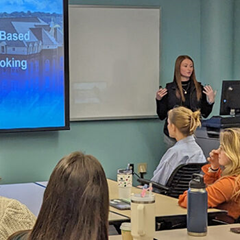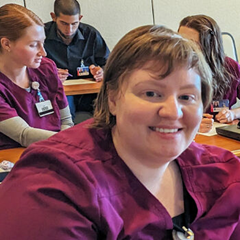Becoming a Registered Dietitian Nutritionist
 To become a registered dietitian nutritionist, you will need to:
To become a registered dietitian nutritionist, you will need to:
- Complete a minimum of a master's degree granted by a college or university accredited by a U.S. Department of Education recognized accrediting agency or foreign equivalent, and coursework through an Accreditation Council for Education in Nutrition and Dietetics accredited Didactic, Coordinated, Graduate or International program which will provide a Verification Statement.
- Complete required supervised practice/experience through an ACEND-accredited Dietetic Internship, Coordinated Program, Graduate Program, or an Individualized Supervised Practice Pathway offered through an ACEND-accredited program.
- Pass a national examination administered by the Commission on Dietetic Registration. For more information regarding the examination, refer to CDR's website.
- Meet requirements to practice in your state. Many states have regulatory laws (i.e. licensure) for food and nutrition practitioners. All states accept the RDN credential for state licensure purposes.
- Stay up to date in dietetics through continuing education. After successfully passing the national exam and earning the credential, RDNs maintain ongoing professional development in order to stay up to date on the latest research, recommendations, and best practices.
Dietetics education programs in colleges and universities are accredited by the Accreditation Council for Education in Nutrition and Dietetics — or ACEND. As an accrediting agency, ACEND makes sure that students preparing for careers as RDNs are getting the education they need to qualify for taking the national RDN exam.
There are several kinds of accredited dietetics education programs — each offering a different experience and "pathway" to RDN eligibility. Search the ACEND accredited program directory to find an accredited dietetics education program.
The University of Dayton and the Premier Health Dietetic internship combine to offer these required elements in synchrony.
The University of Dayton offers three tailored graduate pathways based on your academic background:
- Master of Dietetics and Nutrition (MDN) + Premier Health Dietetic Internship
For students who completed a bachelor’s degree from an ACEND-accredited didactic program in dietetics and hold an ACEND Verification Statement, this integrated program combines complete graduate degree advanced coursework and supervised practice to prepare you for the National Registration Examination to become a Registered Dietitian Nutritionist (RDN). Learn more about the MDN Program. - Advanced Nutrition and Dietetics Graduate Certificate + Premier Health Dietetic Internship
For students who already hold a graduate degree in any field and an ACEND Verification Statement, this certificate is completed concurrent to support prerequisite coursework for the the ACEND accredited Premier Dietetic Internship (PDI) program (hyperlinked to Premier website) required for the National Registration Examination to become a Registered Dietitian Nutritionist (RDN). Explore the Advanced Certificate Program. - Verification Statement Graduate Certificate → MDN or Advanced Dietetics and Nutrition Graduate Certificate + Premier Health Dietetic Internship
For students with a Bachelor’s degree in a field other than dietetics, this sequence provides the coursework to earn the ACEND verifications statement while earning 9 graduate credits towards the Advanced Dietetics and Nutrition Graduate certificate or the Master’s in the Dietetics and Nutrition degree and requires completion of the ACEND accredited Premier Health Dietetic Internship required for the National Registration Examination to become a Registered Dietitian Nutritionist (RDN). Start with the Verification Statement Certificate.
The Premier Health Dietetic Internship provides supervised practice hours as required by ACEND to optimize the potential of each dietetic intern.
Choosing the Right Program

While all ACEND-accredited programs meet the standards and requirements for graduates to become RDNs, the decision about which school or program to attend is personal and should be made based on a variety of factors that are important to you, such as:
- Size of school and program: Would you be more comfortable in a small private school or a large state (public) university?
- Cost
- Available financial aid: What resources are available to you?
- Geographic location: Do you prefer a rural or urban setting, residential or commuter school? Several programs also offer distance education.
- Faculty composition and qualifications: Have you visited the website or campus and talked with faculty?
- Degree awarded: Do you want to begin with a bachelor's degree or immediately pursue a graduate degree?
- Success of graduates in obtaining internship placement and jobs: How well do graduates do after completing the program?
- Success of graduates in pursuing career goals: What are your career goals and do they match the goals of the program?
Talk with program directors (contact information is in the Accredited Program Directory), discuss the program details and ask to visit. It is sometimes helpful to speak with current students and graduates, or RDNs and NDTRs located in the area near the program for insights that may be helpful in making a decision.
The Application Process
Application requirements and admission processes vary depending by program type. For information on applying to accredited dietetics programs, you must research each specific programs requirements and processes. (The programs' websites are listed in the Accredited Program Directory.)
Financial aid
There are many resources to help students pay for college. You may be able to obtain a grant or scholarship from a corporation, community or civic group, philanthropic or religious organization, or directly from your chosen school or college. Federal grants and low-interest loans may also be available.
- State and Local Sources of Financial Aid: Financial assistance is essential for many students enrolled in dietetics education programs. Information about student aid should be sought from the financial aid office or administrator at individual institutions. Additional sources include the state higher education agency and local civic, professional and community organizations or foundations. Detailed information about federal grants and loans administered by the United States Department of Education is available at the Federal Student Aid website.
- Academy Scholarships: Progress in the educational and scientific advancement of dietetics inspires friends and members of the profession to make funds available for qualified candidates to receive scholarships through contributions to the Academy of Nutrition and Dietetics Foundation. In addition, some state and local dietetic associations may offer scholarships to prospective students in their area. You should contact these groups directly for more information.
- International Financial Assistance and Resources Directory: Made possible through the Wimpfheimer-Guggenheim Fund for International Exchange in Nutrition, Dietetics and Management, this 90-page directory is a reference for U.S. and international students and professionals seeking funding for professional study, work experience or research in their home country or abroad.
Career Changers and International Students
If you are interested in a nutrition career, you can become a RDN or a NDTR — even if you have a degree in a different area of study. If you already have a degree from a U.S. institutional-accredited college or university that is recognized by the United States Department of Education, you will need to have your college transcripts evaluated by a director of an accredited dietetics program. Because the policies, procedures and costs for the transcript evaluation may vary from one institution to another, you may want to contact more than one dietetics program for further information. The program director will evaluate your previous academic preparation and identify the courses that you will need to complete at that school to meet the educational requirements for dietetic registration. It may be possible to complete the required dietetics coursework while enrolled in a graduate program. The dietetics program director can advise you of your options.
If you completed your education and training outside of the United States, or received credentials in another country, you may be eligible to become credentialed practitioner in the U.S. Individuals who have completed the education and credentialing requirements in one country may be eligible for another country's credentialing examination if the two countries have entered into a "reciprocity" agreement to allow this. If reciprocity does not apply, you must have your academic degree validated as equivalent to the bachelor's or master's degree conferred by a US regionally-accredited college or university and complete any additional required course work plus an ACEND-accredited supervised practice requirement to establish your eligibility to sit for the exam. It is important to note that all individuals who establish registration eligibility — whether under the provisions of a reciprocity agreement or through the combination of a validated academic degree and supervised practice program — must successfully pass the RDN exam.
Visit ACEND to learn more.
Source: Become A Registered Dietician Nutritionist, https://www.eatright.org/become-an-rdn

